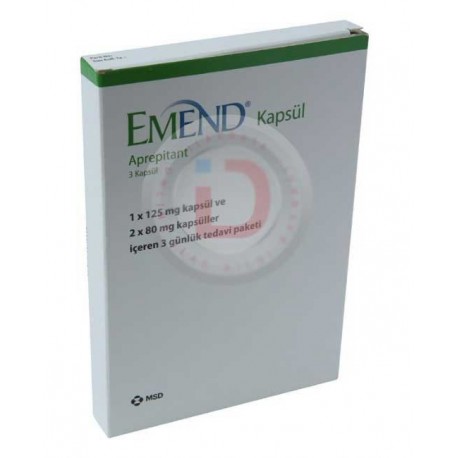 View larger
View larger Emend (Aprepitant) 3 Capsules
EMND9641
New product
BUY MORE PAY LESS
| Quantity | Discount | |
|---|---|---|
| 2 | 5% | |
| 3 | 10% | |
| 4 | 15% | |
| 5 | 20% |
Volume discounts
| Quantity | Discount | You Save |
|---|---|---|
| 2 | 5% | Up to $7.80 |
| 3 | 10% | Up to $23.40 |
| 4 | 15% | Up to $46.80 |
| 5 | 20% | Up to $78.00 |
More info
EMEND capsule Taken by mouth.
Active ingredient
125 mg aprepitant in one capsule, 80 mg in the other 2 capsules
Excipients
Sucrose, microcrystalline cellulose, hydroxypropyl cellulose, sodium lauryl sulfate, gelatin, titanium dioxide, shellac, potassium hydroxide and black iron oxide. The 125 mg capsule also contains red iron oxide and yellow iron oxide.
2. What is EMEND and what is it used for?
• EMEND is used to prevent nausea and vomiting due to chemotherapy (cancer treatment). When used for this purpose, EMEND is always used in conjunction with OTHER MEDICINES.
• EMEND is not used to treat your current nausea and vomiting.
• EMEND is available in blister packages containing 3 capsules in a 3-day treatment package. One of the 3 capsules contains 125 mg of aprepitant (pink-white color), the other two 80 mg (white color)
3. How to use EMEND?
Instructions for proper use and dose / frequency of administration
Always use EMEND exactly as your doctor has told you. If you are not sure, consult your doctor or pharmacist.
Recommended EMEND dosage:
One 125 mg capsule (pink / white color) taken orally 1 hour before starting chemotherapy treatment,
and
• One 80 mg capsule (white in color) every morning for 2 days following your chemotherapy treatment.
Application route and method
• EMEND capsule should be swallowed whole with a glass of water.
• EMEND can be taken on an empty stomach or with food.
• If you already have nausea and vomiting, do not start using EMEND. Ask your doctor about what to do.
Use in children
Do not give EMEND to patients younger than 18 years old.
Use in the elderly
Dose adjustment is not required in the elderly.
Special use cases
No dosage adjustment is required in patients with renal insufficiency or end-stage renal disease undergoing hemodialysis.
Liver failure
No dose adjustment is required in patients with mild to moderate hepatic impairment. There are no data on patients with severe hepatic impairment.
If you have the impression that the effect of EMEND is too strong or too weak, talk to your doctor or pharmacist.
If you use more EMEND than you should
If you have used more than you should use from EMEND, talk to a doctor or a pharmacist.
If you forgot to use EMEND
If you forgot to use EMEND
Do not take a double dose to make up for forgotten doses.
Effects that may occur when treatment with EMEND is terminated
No data available.
4. What are the possible side effects?
Like all medicines, people who are sensitive to the substances contained in EMEND may have side effects.
Side effects are listed as shown in the following categories:
Very common: It can be seen in at least 1 of 10 patients.
Common: It can be seen in 1 to 10 people in 100 patients.
Uncommon: It can be seen in the number of people between 1 and 10 of 1,000 patients.
Rare: It can be seen in the number of people between 1 and 10 of 10,000 patients.
Very rare: may be seen in less than one of 10,000 patients.
Unknown frequency: Cannot be estimated from the available data.
Common:
Burping
Constipation
• diarrhea
Indigestion
Dizziness
• headache
• weakness
• tiredness
Loss of appetite
Hiccups
• increase in liver enzymes
Unusual:
Abnormal dreaming
Trouble thinking
• weakness
Sleepiness
Acne
Oily skin
Rash
Itching
Sun sensitivity of the skin
Wounds on the skin
Excessive sweating
• anxiety
Euphoria (excessive presence of emotions such as joy, confidence, strength)
Disorientation (a person's ability to adapt and adapt to the environment)
Bacterial infection
Fungal infection
Stomach ulcer (heartburn and heaviness, sour water taste in mouth)
Nausea
Vomiting
Heartburn
Taste disturbance
• stomache ache
Swelling
Severe constipation
Dry mouth
Inflammation of the small and large intestine (inflammation)
• farting
Sores in the mouth
Blood in the urine
Increased pain and burning sensation to urinate
Urinating more than usual
Chest discomfort
Swelling (swelling of the skin)
Feeling unwell
• chill
Change in gait
Facial flushing
Hot flushes
Cough
Mucus (discharge) in the back of the throat
Throat irritation
Sneezing
• throat ache
Watery and itchy eyes
Tinnitus
Cramping and pain in the muscles
Muscle weakness
Excessive thirst
Weight gain or weight loss
High blood sugar
Slow heart rate
Rapid or irregular heart beat
Heart or blood vessel disease
High risk of infection with fever
Reduction of red and white blood cells in the blood
Low sodium values in the blood
One-time cases are reported below:
Stevens-Johnson syndrome (rare serious skin reaction)
Angioedema (swelling of the face, lips, mouth, tongue, or throat causing difficulty in swallowing or breathing)
Severe constipation, insufficient functioning of the small intestine (bowel obstruction)
• hives

